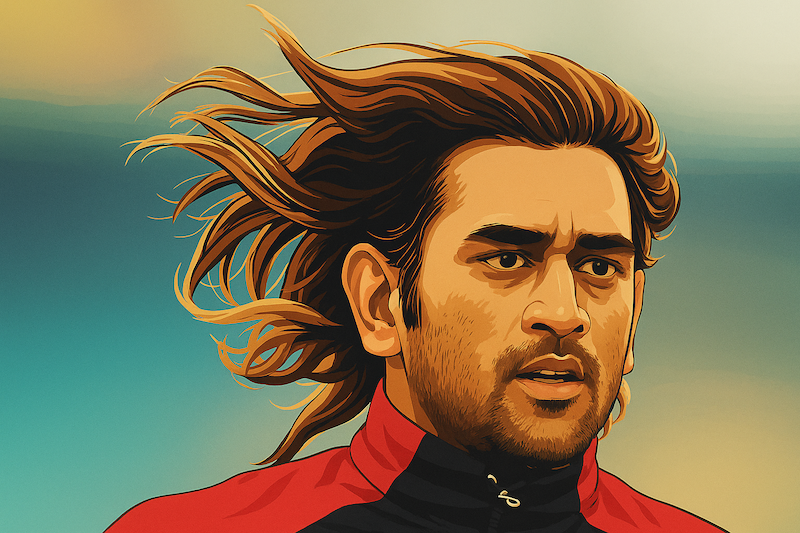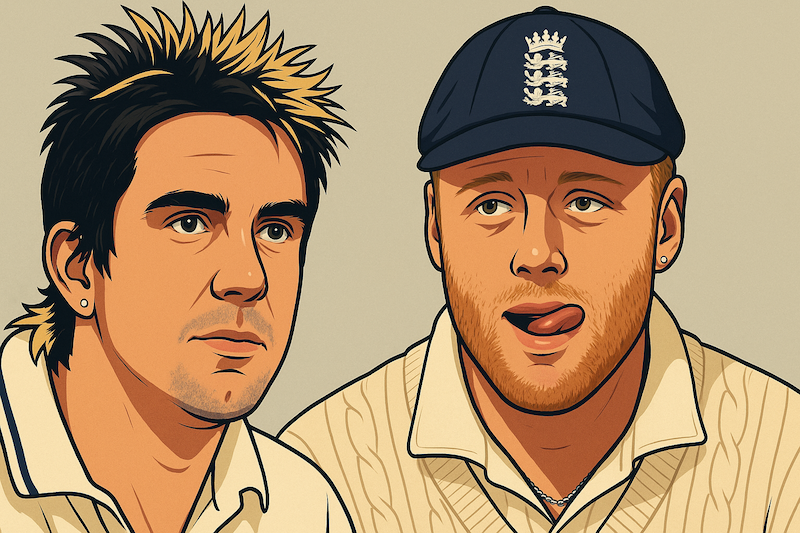
Few cricketers transformed Indian cricket like Sourav Ganguly. His batting brought grace through elegant cover drives, but it was his leadership that changed everything. He gave India belief, pride, and a fearless attitude, inspiring a generation to win not just at home but on the toughest grounds abroad.
Early Years and Breakthrough
- Born into a sporting household in Kolkata, Ganguly first loved football before turning to cricket under the influence of his elder brother, Snehasish.
- He made a brief ODI debut in 1992 but was dropped after one innings, with critics branding him arrogant and unproven.
- He stormed back in 1996 with a sparkling 131 on Test debut at Lord’s, followed immediately by 136 in Nottingham.
- By 1999, he had become one of the most prolific ODI batsmen, scoring nearly 1,800 runs in a calendar year.
- His elegant cover drives and unmatched stroke play through the off side earned him the nickname “God of the Offside.”
Defining Innings
- Scored a career-best 183 against Sri Lanka in the 1999 World Cup, the highest individual score by an Indian in the tournament at the time, and still one of the top knocks in World Cup history.
- Struck 141 against South Africa in the semifinal of the 2000 ICC KnockOut, then followed it with 117 in the final against New Zealand, though India fell short — a run of back-to-back tournament-defining hundreds.
- Hit a commanding 111 not out in the 2003 World Cup semi-final against Kenya, leading India to the final with a captain’s knock under pressure.
- Played a majestic 144 at Brisbane in 2003, setting the tone for India’s remarkable series draw in Australia - a defining away innings against a world-class attack.
- Produced a gritty 239 against Pakistan in Bangalore in 2007, his highest Test score, underlining his class in the later phase of his career.
Captain in a Crisis
- Ganguly took over as captain in 2000 during the match-fixing scandal, when Indian cricket was at its lowest point and desperately needed rebuilding.
- He instilled confidence and aggression, leading India to major finals such as the 2000 ICC KnockOut, the 2002 Champions Trophy (shared with Sri Lanka), and the 2003 World Cup.
- Under his leadership, India broke barriers abroad with historic away wins in Australia, England, Pakistan, and the West Indies, proving they could succeed outside home conditions.
- His shirt-waving celebration on the Lord’s balcony after the 2002 NatWest Trophy final became the symbol of a fearless, unapologetic new India.
- He backed and empowered a new generation of players — including Sehwag, Yuvraj, Harbhajan, Zaheer, and Dhoni — many of whom went on to become legends and form the core of India’s future success.
- His captaincy record across formats is summarised below:
| Format | Matches | Wins | Losses | Draws/NR | Win % |
|---|---|---|---|---|---|
| Tests | 49 | 21 | 13 | 15 | 42.85% |
| ODIs | 146 | 76 | 65 | 5 | 52.05% |
Explore More Stories

Dhoni 148 vs Pakistan 2005: The Breakthrough Innings
April 2005, Visakhapatnam. MS Dhoni walked in at No. 3 and blasted 148 off 123 balls against Pakistan — the knock that transformed him from a rookie into India’s new match-winner.

2005 Ashes: The Summer Cricket Became Theatre
The 2005 Ashes was more than just a cricket series. It was a rollercoaster of emotion, courage, and unforgettable moments that brought Test cricket back to life. England’s long wait finally ended, and the world watched history unfold.
Conflict and Comeback
- In 2005, Ganguly’s fallout with coach Greg Chappell turned ugly, highlighted by a leaked email calling him “unfit to lead.” He was stripped of captaincy and dropped from the team, sparking public outrage and protests back home in Bengal.
- Returned to the Test side in late 2006 against South Africa, top-scoring with a fighting 51 in Johannesburg to help secure India’s first-ever Test win on South African soil. He went on to finish as India’s leading run-scorer in the series.
- His ODI comeback was equally impactful — scoring a match-winning 98 against West Indies and later being named Man of the Series against Sri Lanka.
- Reinvented himself in 2007 as one of the world’s most consistent batsmen, piling up 1,106 Test runs at 61.44 and 1,240 ODI runs at 44.28, second and fifth globally in those formats.
- Crowned his comeback with a Player of the Series show against Pakistan at home in 2007, where he amassed 534 runs, silencing critics and proving his class was as strong as ever.
Farewell and Beyond Playing
- Announced his retirement in 2008 during the home series against Australia, closing the chapter on a career that redefined Indian cricket.
- In a memorable gesture during his final Test, MS Dhoni invited him to lead the side for the last few overs — a symbolic passing of the torch.
- Transitioned into commentary and coaching, known for his sharp analysis and mentoring roles in the IPL, shaping young players.
- Rose to become President of the BCCI in 2019, where he championed initiatives like the day-night Test in India and the Women’s Premier League, furthering his impact off the field.
Career Totals
| Format | Matches | Runs | Average | Centuries | Wickets |
|---|---|---|---|---|---|
| Tests | 113 | 7,212 | 42.17 | 16 | 32 |
| ODIs | 311 | 11,363 | 41.02 | 22 | 100 |
| World Cups | 21 | 1,066 | 55.25 | 4 | 10 |
Career Highlights
- Became the third cricketer overall, and the first Indian, to score a century on Test debut at Lord's (131 vs England, 1996).
- Formed a record-breaking ODI opening partnership with Sachin Tendulkar, amassing over 6,600 runs together - the most prolific pairing in ODI history.
- Among the few players to achieve the double of 10,000+ ODI runs and 100 wickets.
- Only player to win 4 consecutive Man of the Match awards in ODIs.
- Led India to victory in the 2002 ICC Champions Trophy (shared with Sri Lanka).
- Led India to the 2003 World Cup final and 11 overseas Test wins, breaking India’s long-standing struggle abroad.
- Awarded the Padma Shri, India’s fourth-highest civilian award, in 2004.
- Received the Banga Bibhushan Award in 2013, West Bengal’s highest civilian honor.
- Served as President of the Board of Control for Cricket in India (BCCI) from 2019 to 2022, shaping major reforms and initiatives.
- Honored with multiple leadership roles in Indian cricket, including Chairman of the ICC Cricket Committee.
Legacy
Sourav Ganguly’s greatest gift to Indian cricket was belief. At a time when the team was reeling from scandal and self-doubt, he instilled confidence, aggression, and the courage to win abroad. His leadership created a new identity for Indian cricket — fearless, unapologetic, and ready to challenge the best.
Beyond his runs and records, his true legacy lies in the generation he nurtured. From Sehwag and Yuvraj to Dhoni and Zaheer, Ganguly built the foundation for India’s golden era. Even after retirement, as BCCI President, he continued to shape the game. For fans, he will always be remembered as the “Dada” who transformed Indian cricket from hopefuls into contenders.
















